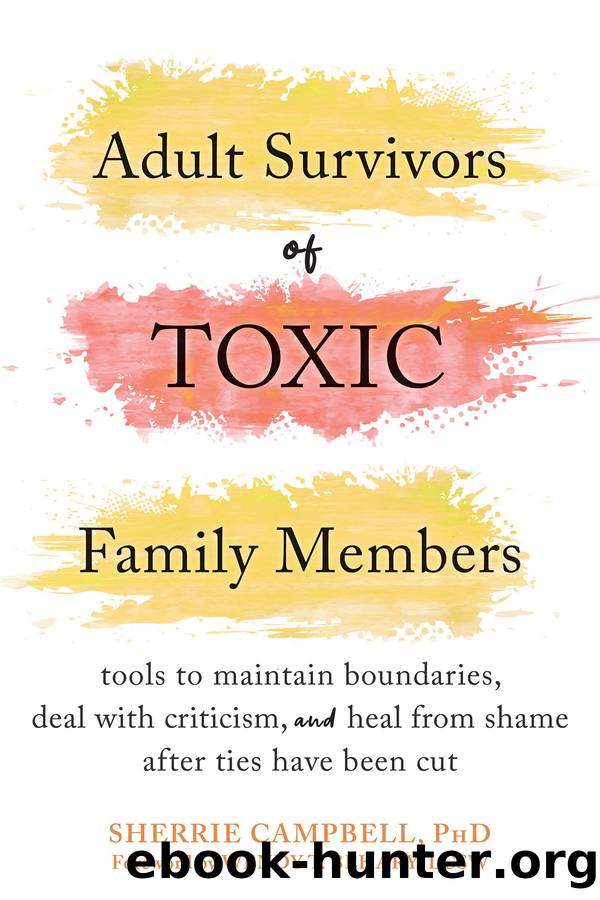Adult Survivors of Toxic Family Members by Sherrie Campbell

Author:Sherrie Campbell
Language: eng
Format: epub
Publisher: New Harbinger Publications
Published: 2022-02-11T20:38:16+00:00
A simple truth: every child has a legitimate need to be noticed, understood, taken seriously, and respected by their family. When this was not your reality, you must learn to stand firm in who you areâin your needs to be noticed, understood, taken seriously, and respected by the people you choose to have in your life today. The mindset to hold is that you have paid your emotional dues when it comes to love. Make no excuse for abuse. Shift your perception from feelings of powerlessness to actively taking charge of your lifeâs direction. You cannot go back and change what you did not get. However, you have the power to determine who is in your life today and how you choose to be treated.
I encourage you to become more honest, respectful, and conscious of who you are and the negative impacts your family has had. From this awareness, you can become less destructive in your own life toward yourself and others. Instead of ignoring what happened to you and allowing others to ignore it or excuse it away, open your eyes and the eyes of others to the vast damage done by a blatant double standard in the family system and society as a whole. The double standard is this: It is considered morally wrong to cut ties with our family, yet it is morally acceptable and even encouraged to cut ties with nonfamily abusers. People are people, and abusive family members shouldnât be given more power than any other abusive individual.
It is only when you speak your truth that you will know how to love and be loved. Learning how is no small task for those coming from a psychologically manipulative family.
Your twisted family dynamic has lifelong aftershocks. Part of riding out the aftershocks is learning to manage the impulse to leave relationships to protect yourself, when leaving may not be warranted. Conversely, you may need to work on not staying in unhealthy relationshipsânot tolerating disrespect far past the time you should. Or you may need to work on getting past the decision to abolish love and relationships altogether.
This space between staying, continuing to try, or going can be horribly murky, because you have not been taught to trust your instincts. The impulsesâto stay too long, leave too early, or not attach at allâare a result of complex post-traumatic stress disorder (C-PTSD). Pete Walker, in his book Complex PTSD: From Surviving to Thriving, defines C-PTSD as a âsevere form of post-traumatic stress disorder. This is the syndrome you develop when you do not pass through your psychosocial stages healthfully. Complex PTSD is delineated from the more well-known post-traumatic stress syndrome by five of its most troublesome features: emotional flashbacks, toxic shame, self-abandonment, a vicious inner critic, and social anxiety.â16 C-PTSD symptoms also include flashbacks, triggers, and core wound reactions common with other forms of PTSD. Letâs look at these features of C-PTSD more closely.
Download
This site does not store any files on its server. We only index and link to content provided by other sites. Please contact the content providers to delete copyright contents if any and email us, we'll remove relevant links or contents immediately.
Toxic Parents by Susan Forward(3284)
Sapiens and Homo Deus by Yuval Noah Harari(3068)
The Gaslight Effect by Dr. Robin Stern(2791)
Borders by unknow(2304)
The Body Keeps the Score by Bessel van der Kolk MD(2210)
Cruel to Be Kind by Cathy Glass(2197)
Life After Darkness by Michelle Knight(1964)
A Child Called It by Dave Pelzer(1870)
Rethinking Narcissism by Dr. Craig Malkin(1761)
Next Time, She'll Be Dead by Ann Jones(1568)
Future Design by Unknown(1567)
Broken by Rosie Lewis(1515)
Daddy's Little Secret by Tina Davis(1505)
A Stolen Life by Dugard Jaycee(1496)
Legacy of the Heart by Wayne Muller(1490)
Running on Empty: Overcome Your Childhood Emotional Neglect by Webb Jonice(1468)
Mothers Who Can't Love by Susan Forward(1465)
Umbrella by Will Self(1450)
Healing Your Emotional Self by Beverly Engel(1372)
